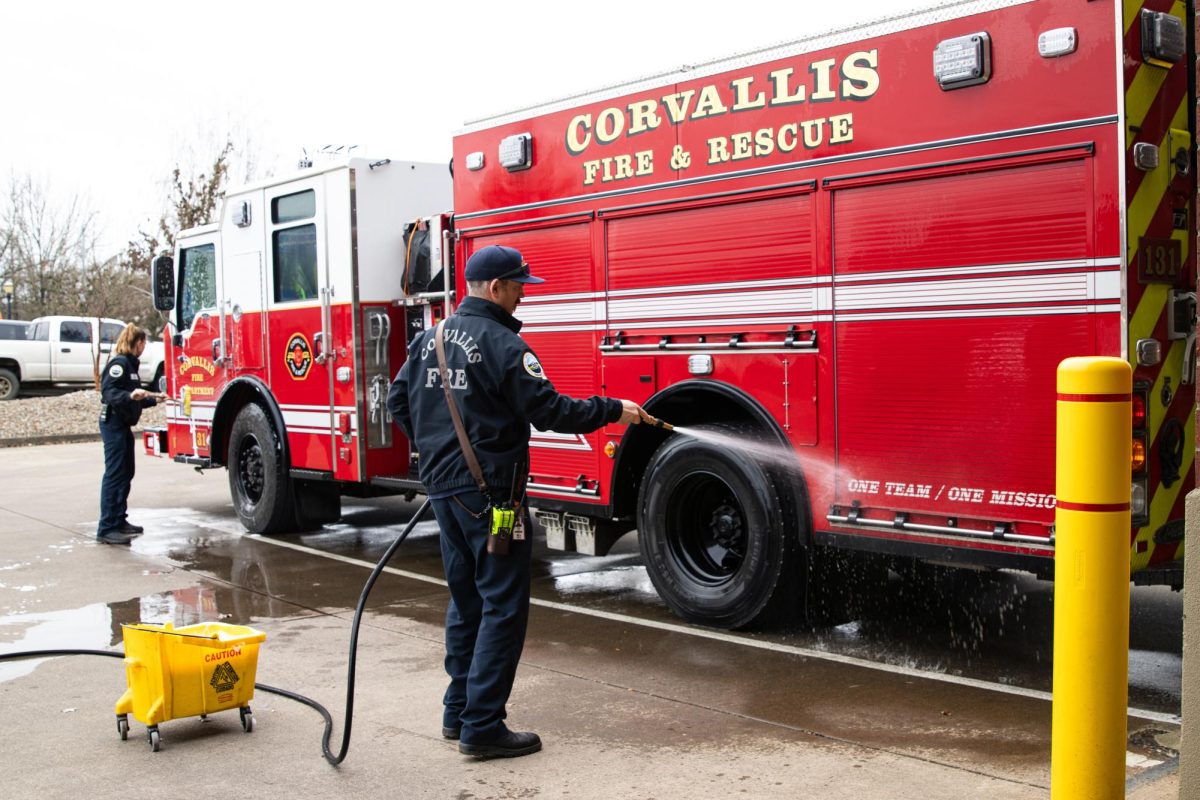Shea: Study abroad provides learning experience
January 22, 2018
Students who study abroad step out of comfort zone, face new challenges.
Almost every college student has seen cool study abroad photos on Facebook, something like a dusky and dramatic photo of someone poised on a wrought iron chair at a French cafe, feasting on bread, cheese and wine with the Eiffel Tower in the background. According to the National Association of Foreign Student Advisers, 325,339 college students studied abroad in the 2015- 2016 school year, amounting to approximately 1.6 percent of U.S. students attending higher education. But what is study abroad really like? Is it actually worth it? My answer is a resounding “yes.” Of course, it is a huge decision to make, and hopefully this column, which will walk through perspectives on study abroad from students who went on exchange recently, will provide some insight.
For anyone who deals with mental illness, like I have, you might want to study abroad but are worried that the experience will be an awful and traumatizing one. Or, maybe you are someone who loves the idea of study abroad but is just scared to leap into the unfamiliar. If so, I can tell you that my experience in Ireland was the best and some of the most educational consecutive four months of my life. It started out rough, certainly. I am not saying it will be easy or comfortable for the first few weeks, because it probably will be the exact opposite. But I found that I was capable of more independence than I had ever thought, and in my opinion, the only way to learn is by doing.
One common theme among Oregon State students who have completed a study abroad experience is learning to trust that there are good people everywhere in the world.
Sara Heitzhausen, a fourth-year student majoring in public health, spent fall term 2017 studying abroad in Cork, Ireland, through a program run by IE3 Global. Heitzhausen, before leaving to Ireland, was scared of feeling alone and uncomfortable in her new home.
“My main fears of studying abroad included the idea of moving halfway across the world, being my first time ever traveling alone and first time to Europe,” Heitzhausen said via email. ”The fear of not finding comfortability or friends in Cork. The fear of not easily meeting people and making friends.”
However, once Heitzhausen arrived in Cork, she found that her fears had been unfounded.
“Multiple times I came across needing to ask for help while traveling and every single person lent a helping hand,” Heitzhausen said via email. “People want to see others happy and do well. There is truly so much good in the world.”
Another common theme is that study abroad helps people learn to relax a little bit, which in turn makes life more enjoyable. Letting stress and anxieties balloon out of control is certainly an issue that is prevalent on college campuses across America, and in Europe as well, in my experience.
Natalie Bryant is a second-year student majoring in microbiology. She studied abroad through Academic Programs International (API), spending fall term 2017 in Sevilla, Spain.
“I am a planner, very type A, but spending time and money on new cultures made me realize the value of flexibility. Spain is laid-back in every way, but I found that you can be both productive and relaxed—time is not money all around the world!” Bryant said via email.
Tori Puoci is a second-year student majoring in biochemistry and molecular biology. He is also in the Honors College, and spent two weeks in France on an HC learning abroad trip. Puoci traveled through France learning and exploring in a group with other HC students led by HC faculty. He spent one week in Lyon and one week in Paris.
“I am definitely someone who worries way too much about the logistics of scheduling. That being said, within the first couple days of the trip, I learned that I just need to relax, other people are capable of taking care of themselves and things will all work out in the end,” Puoci said via email. “Since realizing this, my life has been way less stressful; if I had stayed so uptight during the trip I would not have tried as many new things as I did and I definitely would not have had as much fun.”
Some of Puoci’s experiences included visiting the Institut Lumière film museum, a vineyard and winery and the Louvre, as well as having free time to explore Lyon and Paris, and making new friends.
But while studying abroad is not something to be scared of, it is also not one big party like some college students come to believe. There are a lot of challenges, and it takes some courage to leave everything that is familiar and go live in a new country.
“My least favorite part was that the temperatures were in the mid-’90s most of the time, and none of us were really prepared for that coming from cool Corvallis. Still, that’s not something we could have changed, and we made do with our room fans and wet paper towels,” Puoci said via email.
It can be difficult to adjust to new weather patterns, new ways of greeting others, new accents, new transportation systems and more. Sometimes you feel lost, or like you do not belong. If you are like me, you will face panic attacks, but even through them I was still happy to be in Ireland, and they faded in time. There are other drawbacks to living abroad as well, like little to no choice in housing.
“My one and only least favorite aspect of studying abroad was my housing accommodation because I wasn’t used to not having hot water all times of the day and not having the greatest washer and dryers, but these things are so small compared to the entire experience I was lucky enough to have,” Heitzhausen said via email.
Money is also a consideration. My study abroad program was originally about $17,500 for a semester, including airfare, food and housing estimates, but I was able to apply for and receive scholarships which almost halved the cost. Puoci also was able to cut costs.
“I also applied for the Honors experience scholarship, which helped make the trip more affordable,” Puoci said via email.
While studying abroad is expensive, there are ways to overcome this drawback, although even then the price may make the experience overall not worth it to some.
Despite experiencing fear, new challenges and setbacks abroad, most students who have studied abroad think others should do so as well, and have encouragement for those who are still trying to decide.
“Study abroad! It will hands down be the absolute best thing you’ll ever do in your life. I was so scared and nervous to embark on my study abroad journey by myself, I had tears down my face as my plane took off from PDX. But the moment I landed in Ireland I hit the ground running and instantly made friends and made the most incredible memories one day at a time,” Heitzhausen said via email.
Not only does study abroad provide the chance to see beautiful and fascinating new places, and meet awesome new people, the process of navigating a wide variety of experiences where I was lacking important knowledge made me learn to trust myself and my competency completely. I also was able to increase the diversity of my friends, learning more about the limits of Western and American ways of thinking in a way I would never have been able to achieve at home.
“If you have an inkling of a feeling that you might want to study abroad, then go! I went to the informational meeting for this trip thinking one day I might be able to afford this and be able to go. Once I heard about the different experiences and met the faculty leading the trip, I decided I would apply and see what happens,” Puoci said via email. “I’m definitely glad I went on this trip, I learned a lot about myself and, though it was tough at times, being able to explore who I am and what I value was wonderful.”
Taking a week, month, year or more abroad is certainly not everyone’s cup of tea, but if you have the opportunity and any desire to go, do not let fear hold you back! I studied abroad to confront one of my biggest fears, and I thought I would be relieved to return home and put Cork in the past. I certainly did not expect to feel like I was leaving home, and I never expected to make such good friends or love my classes so much. It was quite the emotional betrayal. But that’s the thing about the future: you can’t expect the best parts, because they’re outside your realm of experience. You just have to keep pushing. All the worst parts of my study abroad, including one awful, cold and stormy three hour boat trip where one woman threw up and the rest of us were soaked and nauseated, I view as challenges that I overcame and am better for. I am grateful to have had this experience that has changed the way I perceive the world and the way I perceive myself. The more places and people you love, the less intimidating the world becomes.


















































































![Newspaper clipping from February 25, 1970 in the Daily Barometer showing an article written by Bob Allen, past Barometer Editor. This article was written to spotlight both the student body’s lack of participation with student government at the time in conjunction with their class representatives response. [It’s important to note ASOSU was not structured identically to today’s standards, likely having a president on behalf of each class work together as one entity as opposed to one president representing all classes.]](https://dailybaro.orangemedianetwork.com/wp-content/uploads/2025/03/Screenshot-2025-03-12-1.00.42-PM-e1741811160853.png)
























